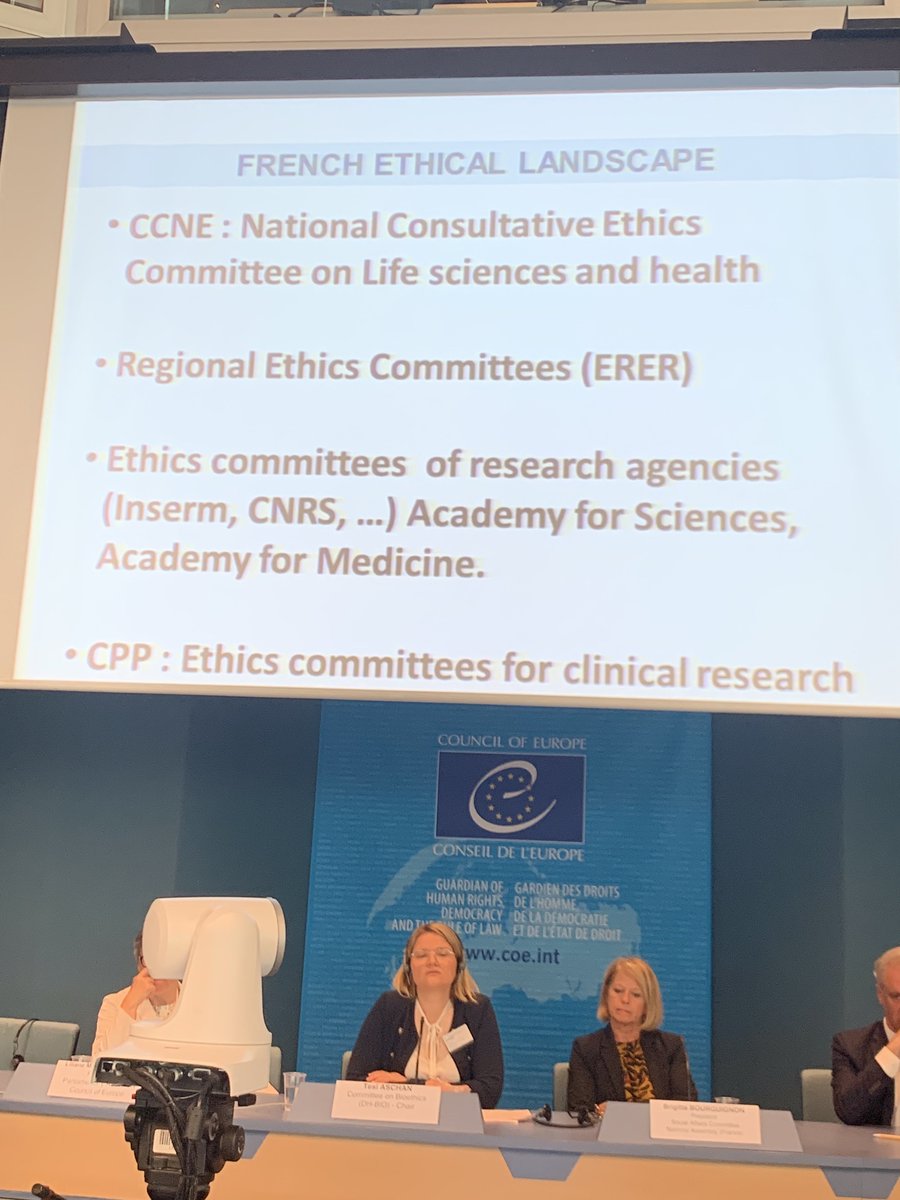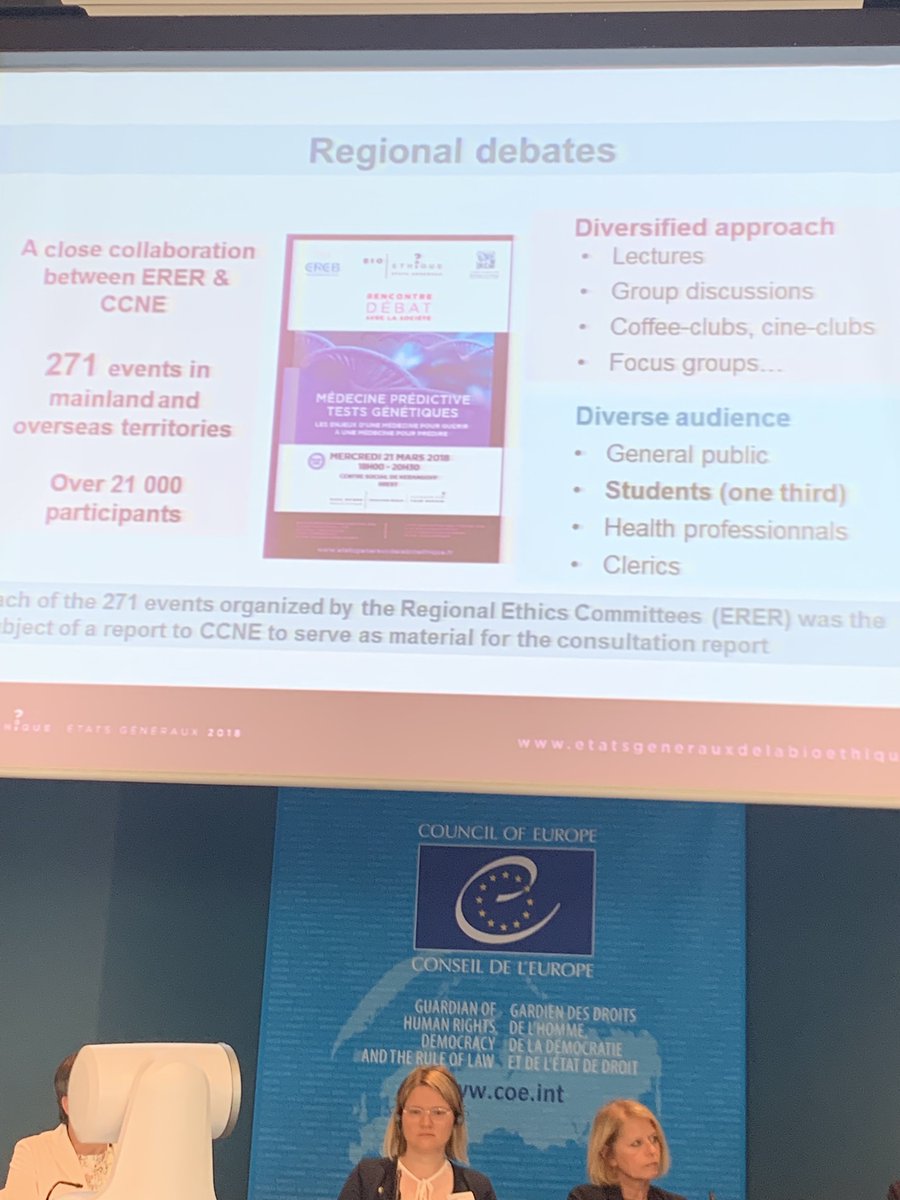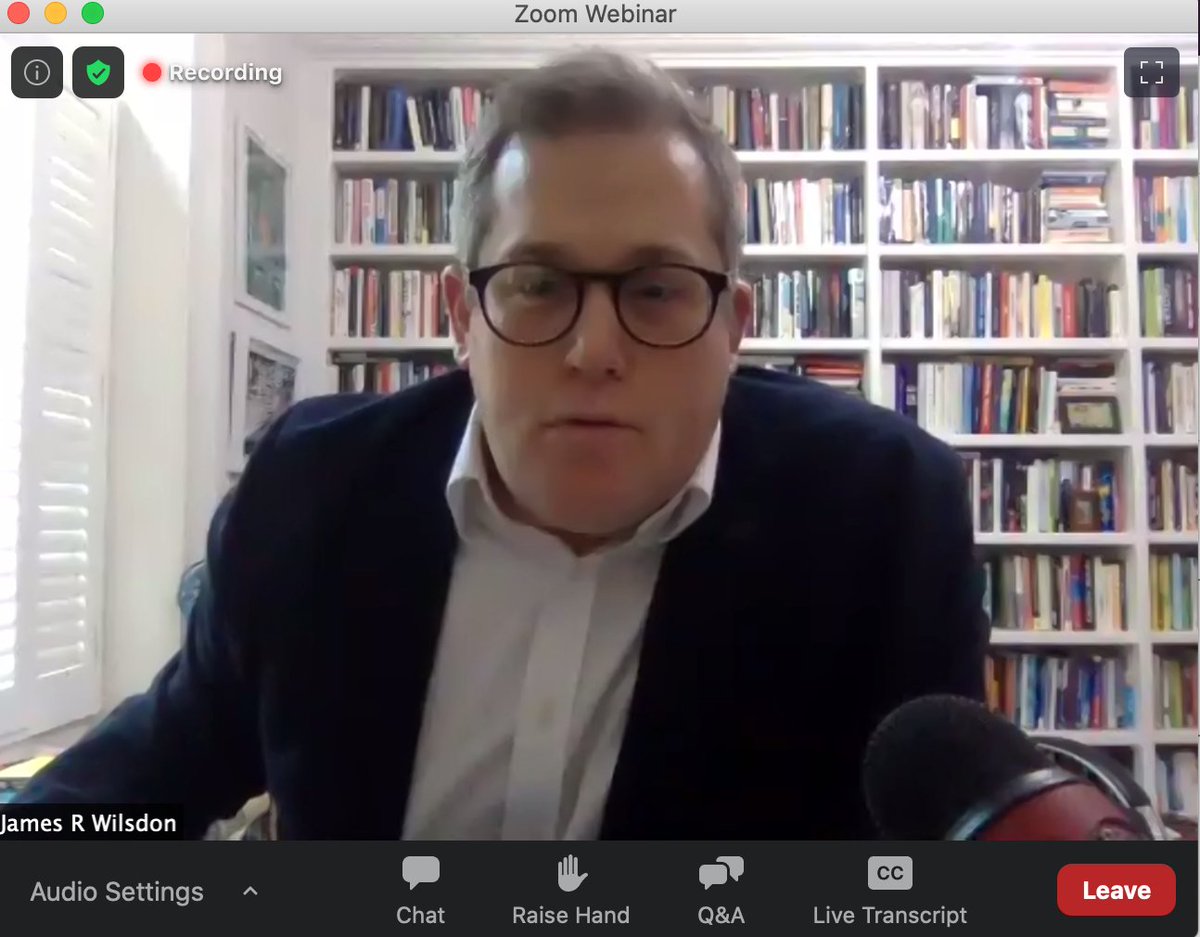Today I'm @coe #DHBIOdebat to explore how to use public debate as a tool for the governance of new technologies.
coe.int/en/web/bioethi…
Or follow me on Twitter, or mute me if this isn't your thing 1/
coe.int/en/web/bioethi…
Or follow me on Twitter, or mute me if this isn't your thing 1/
@coe 3/ The focus of the conversation is the Oviedo Convention and the requirement it places on member states to support public debate and engagement on biotechnology coe.int/en/web/bioethi… #DHBIOdebat
@coe 4/ Importantly, the protection of Human Rights is at the centre of the convention >not a focus for many of the people in my bit of the world #DHBIOdebat
@coe 5/ First up Brigitte Bourguignon, President Social Affairs Committee the National Assembly, France, "Ethics as the science of malaise" >a bit of a dismal view! #DHBIOdebat
@coe 6/ She's highlighting the fact that any decisions in France on biotechnology/ biomedicine must be preceded by public engagement (assemblies etc) commissioned by the Ethics Committee (sorry, missing formal names) #DHBIOdebat
@coe 7/ she identifies limits to public debate- i. conclusions of public processes are not binding on public, we must make this clear she says #DHBIOdebat
@coe 8/ second limit, ii. politicians must be free to change the scope of the debate - she highlights the end of life debate where it sounds like citizens wanted to go further than politicians #DHBIOdebat
@coe 9/ "in someways politicians are no better informed than the public" and this highlights the role that public engagement can play in informing the public and policy makers >this is not a point that is often acknowledged #DHBIOdebat
@coe 10/ Next up: Liliane Maury Pasquier, President of Parliamentary Assembly, Council of Europe. She's highlighting the importance of public engagement and debate, but worries about the lack of knowledge about the issues and therefore challenge of making informed choices #DHBIOdebat
11/ >while this is true, we need to make sure that promoting public debate isn't seen as synonymous with educating the public. It's not just about the science and scientific experts pouring their knowledge into citizens #DHBIOdebat
12/ she is talking about principles for the debate, it must be open, transparent, adversarial, guided by compliance with standards such as human rights. #DHBIOdebat
13/ In terms of openness she mean as many people as possible taking part> while this seems self evident, it ignores the equal importance of ensuring deeper deliberation which may mean smaller groups of citizens engaging more deeply #DHBIOdebat
14/ Next up is Christophe Poirel, Director of Human Rights (I assume of CoE). The concept of human dignity is a central pillar of human rights, as is the idea of human integrity. And these are at the centre of the Oviedo Convention #DHBIODebat
15/ >and it seems to me that these concepts provide important boundaries for public debate helping to ground it and give it a centre to help people make sense of the findings #DHBIOdebat
16/ in conclusion from this panel, lots of support for public engagement, but not many specifics, and slightly worrying focus on volume of engagement rather than quality. #DHBIOdebat
17/ #DHBIOdebat
18/ next up is Jean-Francois Delfraissy, President National Consultative Ethics Committee (France). There are a number of structures for promoting public debate and ethics in France #DHBIOdebat 

19/ #DHBIOdebat
20/ he's outlining the regional ethical committees which work with health professionals and the aim is over next 5 years to develop a meaningful national conversation about ethics, all this underpinned by the bioethics law #DHBIOdebat
21/ The role of the ethics committee is to hold the space open, summarise and synthesise what citizens are saying and support effective debate involving experts <-> civil society <-> public #DHBIOdebat
22/ The committee has delivered something that involves a large number of people. What I can't tell is whether the hearings are open public meetings or deliberative mini-publics. #DHBIOdebat 

23/ much of what he is saying suggests that this is still very surface level - ie "young people are much more distrustful of AI" - but he didn't reflect on whether they got into questions of why this is and whether underlying values differ from those of older people #DHBIOdebat
24/ he highlights 9 themes covered, all very technology focused. Interestingly the 10th theme was raised by participants - organisation of the healthcare system, and their involvement in it - which isn't technical at all, but social #DHBIOdebat
25/ It seems to me that we need to really understand what we mean by diversity of engagement. This slide suggests the french focus is on volume, ie it's open access and so those who turn up are involved #DHBIOdebat 

26/ the citizens' committee appears to be the only randomly selected element where citizens recruited to reflect the population of France>that's a large burden to place on 22 citizens! #DHBIOdebat
27/ He is exploring the role of the national committee as the centre of a network of ethics committees and conversations. potentially an element of the architecture I've laid out before nature.com/articles/d4158… #DHBIOdebat
28/ he notes that no tool is perfect, and that any biomedical debate must be sustained and not just taking place over a couple of months> these are two absolutely critical points that should guide future planning for public engagement on this topic #DHBIOdebat
29/ he expands on the point I picked up on in tweet 24. Citizens see the healthcare system as much more than technology, and question the role of the patient in a system using genomics/ AI etc, and demanding access to care as an essential right. #DHBIOdebat
30/ He is now getting into the role of the media in promoting public debate and highlighting the challenge of getting them to engage in the complexity of the debates #DHBIOdebat
31/ he's highlighting the challenge of parliament not reflecting the debates themes in their own decisions>framing is absolutely critical and effective involvement of parliamentarians might also help #DHBIOdebat
32/ I went quiet because I was on the panel, looking at national level debates about public engagement. #DHBIOdebat
33/ I won't try to report it all. The key tension that emerged for me was between prompting an open public debate (thro media and social media) which helps generate understanding of 'what' different publics want and... #DHBIOdebat
34/ ... prompting engagement which is slower, more deliberative and generates robust evidence about 'why' publics want different things and how they might resolve the tensions and trade-offs between different value sets #DHBIOdebat
35/ if you really want to see what the panel covered, and I said, then I'm sure the webcast will allow you to look back at the end of the event #DHBIOdebat vodmanager.coe.int/live/?appname=…
36/ next panel post lunch is looking at public debate at the international level. I'm going to try to summarise and synthesise rather than live tweeting, partly given how few of my followers are likely to be interested in this topic #DHBIOdebat
37/ Interesting, @FDSD_org, Austria has a new parliamentary committee on future generations. #DHBIOdebat
@FDSD_org 38/ Stefan Schennach from Austrian parliament is sketching out a new role for politicians. He sees them moving beyond being the law makers to the people in the system who are making different perspectives visible and trying to find the balance between them #DHBIOdebat
@FDSD_org 39/ echos conversations on margins of today; debates about role of public engagement is going to have to focus also on the reform of our democratic institutions. Otherwise all public engagement can be is a sticking plaster over the cracks in our institutions #DHBIOdebat
@FDSD_org 40/ people are really down on referendums here, reference to a referendum in Austria which banned the use of nuclear energy on the basis of a 50.3% majority #DHBIOdebat
@FDSD_org 41/ Mariachiara Tallacchini from Catholic University of the Sacred Heart just quoted ee cummings which might be a new motto for #demopart
“Always the beautiful answer who asks a more beautiful question.”
#DHBIOdebat
“Always the beautiful answer who asks a more beautiful question.”
#DHBIOdebat
@FDSD_org 42/ So far, panel presentations have either focused on questions relating to the quality of engagement in ways that are as relevant to national level, or on ways that international institutions engage. Nothing yet on connections between national and international #DHBIOdebat
@FDSD_org 43/ in part this problem is because there is, as David Winockoff from OECD has just said, because there is no global public sovereign power #DHBIOdebat
@FDSD_org 44/ part of the resolution to this that is emerging from different speakers is the development of global norms - eg human rights, public engagement practice at intl level - which supports and incentivises public engagement
@FDSD_org 45/ Another part of the resolution is the emerging networked governance at different levels. The key question that emerges is how these networks link up and connect #DHBIOdebat
46/ and maybe the fault is mine, very much a governance and process person, looking for structures to connect debates at different levels, rather than seeing and understanding the relevance of emerging norms and networks #DHBIOdebat
47/ I think that the problem I have, that David partly engages with, is that these networks are largely unknown at national level, and operate in an untransparent manner, and the norms, esp human rights, is contested, at least in UK #DHBIOdebat
48/ Another key theme emerging from panel is that, while developing effective national debate is a big challenge, doing it at international level is even harder as you try to navigate power, different cultures, institutional structures, values of knowledge etc #DHBIOdebat
49/ A number of speakers are questioning whether there really is a global public (or global publics) to engage. I think this is a big problem myself #DHBIOdebat
50/ Ben Hurlbut (Arizona State Uni) "technology requires (but rarely gets) the consent of the governed", and focuses on the impact rather than on imagined futures, norms and conceptions of benefit #DHBIOdebat
51/ the debate about human rights has focused, largely he says, on the rights element of the phrase, but new technologies, AI, gene editing etc, is bringing the conception of 'human' and what the conception of the human is to the fore #DHBIOdebat
52/ Ben talks us through the idea of a global observatory that he's involved in. Critically, this observatory would focus on debating the questions that are being asked, it would debate the debate nature.com/articles/d4158… #DHBIOdebat
53/ In response to my question asking what one thing the panel would change to promote global public debate, Ben draws parallels with the emergence of Human Rights at end of WW2 as new sites of policy making suggests his change would be to... #DHBIOdebat
54/ .. avoid trying to put a framework around the idea of PE and then aim to implement it, rather he'd expand the notion of what constitutes public debate, expand scope of debate and change idea of what success is #DHBIOdebat
55/ rough quote: "the most important thing needed in public debate/ engagement is openings for inviting dissent" says Ben Burlbut #DHBIOdebat
56/ that will be Ben Hurlbut... (vis last tweet) #DHBIOdebat
57/ Final session that is going to focus on what @coe might do next. I'll summarise and synthesise again #DHBIOdebat
@coe 58/ an important reminder from Siobhan O'Sullivan; we haven't defined governance, quotes a Canadian definition: governance determines who has power, who makes decisions, how other players make their voice heard and how account is rendered #DHBIOdebat
@coe 59/ Human rights can support good governance because they provide both legal and moral force, as well as a set of performance standards to hold people accountable to #DHBIOdebat
@coe 60/ that last tweet a near quote of Siobhan #DHBIOdebat
@coe 61/ A strawman being put up here by the French Ambassador, 'why should participatory democracy always be put above representative democracy?', this isn't what I hear advocates of deliberation calling for... #DHBIOdebat
@coe 62/ for most of day people have been focusing on how different modes of engagement feed into each other and governance #DHBIOdebatand
ENDS/ that's it from me, shame we finished on that point, overall a stimulating set of sessions #DHBIOdebat
• • •
Missing some Tweet in this thread? You can try to
force a refresh





